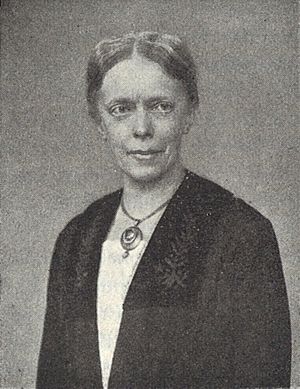Hilma Borelius facts for kids
Hilma Johanna Ulrika Borelius (1869–1932) was a very important Swedish woman. She loved studying books and writers. In 1910, she became the first woman to get a special teaching title called "docent" at Lund University. Later, in 1922, she became a temporary professor there.
Hilma also wrote a big book about Scandinavian literature in German in 1931. It was called Die Nordischen Literaturen. She strongly believed that women should have the right to vote. From 1903 to 1908, she led the women's voting rights group in Lund. This group was part of the National Association for Women's Suffrage. Hilma often wrote articles about female authors for magazines like Dagny and Hertha. Throughout her life, she worked hard to improve the position of women at Swedish universities.
Contents
Hilma's Early Life and Education
Hilma Johanna Ulrika Borelius was born in Lund on December 18, 1869. Her father, Johan Jakob Borelius, was a philosopher. Her mother, Hedvig Augusta Vilhelmina, loved books. Hilma grew up with her younger brother in a home filled with books. Her mother encouraged her to read and learn about literature.
When Hilma was 12, she went to a girls' school in Lund. She finished her school studies as a private student at the city's cathedral school in 1891. That same year, she started studying at Lund University. First, her father taught her philosophy. Then, she studied art history, literature, and Romance languages. She earned her first university degree in 1895.
In 1893, Hilma joined a new group for female students in Uppsala. There, she became good friends with Lydia Wahlström, who was also fighting for women's rights. In 1900, Hilma started and led a women's student group in Lund. Famous speakers like Amalia von Helvig and Victoria Benedictsson gave talks at their meetings. Some of these talks were printed in Dagny magazine.
After getting her degree, Hilma went to Paris with her mother. She continued to study French there. In 1898, she worked as a substitute teacher. She taught French and Swedish at a girls' school in Mariestad. Hilma kept studying at Lund University until 1901. In 1909, she earned a special degree in art history and literature. Her paper was about Swedish plays from the 1600s. Her friend Lydia Wahlström encouraged her to keep studying. In May 1910, Hilma earned her doctorate degree. Her main study was about the writer Erik Gustaf Geijer.
Hilma's University Career
In 1910, Hilma Borelius made history at Lund University. She became the first woman to receive the title of "docent." This title showed her excellent academic skills in recent literary history. However, this title did not come with a salary. So, Hilma continued her research from home. She wrote biographies of people like Carl Gustaf von Brinkman. She also published many articles in journals.
In 1922, Hilma was very happy. She was appointed a paid temporary professor at Lund University. She was the only woman teacher among the university's 70 academics. In 1925, a German professor named Oscar Walzel encouraged her to write a history of Scandinavian literature in German. This book, Die Nordischen Literaturen, was published in 1931. It received different opinions from critics.
Fighting for Women's Rights
During her many years at Lund University, Hilma Borelius remained a strong supporter of women's rights. She actively took part in the movement to give women the right to vote. She wrote many articles for journals about female writers. She also contributed essays about the famous writer Fredrika Bremer. As part of the Svenska Kvinnor series, she published a popular book about the poet Hedvig Charlotta Nordenflycht.
Besides starting and leading the Lund female students' association, she was also active in Stockholm's academic women's association. This group was called Akademiskt bildade kvinnors förening. Hilma left 50,000 Swedish crowns to the university. This money was used to fund scholarships for talented female students.
Hilma Borelius passed away in Lund on January 28, 1932. She is buried in the city's Östra kyrkogården.
Honors and Recognition
- Member of The Society of Sciences in Lund
 | Tommie Smith |
 | Simone Manuel |
 | Shani Davis |
 | Simone Biles |
 | Alice Coachman |


